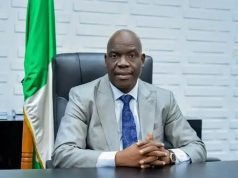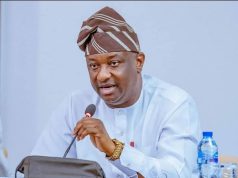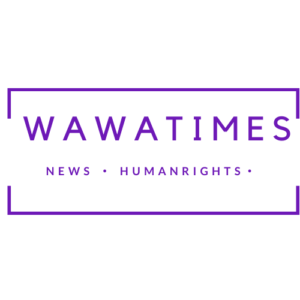By Sharon Pande
It is obvious that members of United Kingdom House of Lords who called on the UK Government to apply sanctions on Nigeria due to their shallow understanding of what constitutes the security problems in the country are, were not looking at the big picture.
From all indication, their conclusion is projected on a myopic mindset at variance with what can be referred to as the general good of the people.
They assume that the regime of sanctions is imperative only to an administration without scrutinizing the merit for such calls.
Since the EndSARS protest which ended in mass destruction of public property and loss of lives including those of security agents, those who had an axe to grind with the current administration of President Muhammadu Buhari decided to add the call for sanctions on Nigeria as part of their demand to achieve the partisan and parochial aim of bringing the administration to its knees.
The projection is based on the belief that when the sanctions are imposed on Nigeria and things begin to get difficult for the government and people, then the opposition elements could use the scenario to tar the administration in dour colours and claim it has failed.
But there is no way anyone with a fair knowledge about what is happening in the country would call for a sanction on Nigeria because, 1) there is absolutely no need for that, 2) it willl compound the socio economic problems in the country, 3) it would further encourage the terrorists and their sponsors to step up the campaign towards destabilising the country and 4) worsen the security problem in the country.
Sanctions generally are of different types and they could be applied either diplomatically, economically, militarily or through sports.
Sanctions in the UK is said to fall under the authority of several different departments like the Foreign & Commonwealth Office (FCO) which is responsible for negotiating international sanctions and has overall responsibility for the UK’s policy on sanctions and embargoes; the HM Treasury (HMT) which is responsible for making designations under UK domestic financial sanctions and for the implementation and enforcement of all financial sanctions in the UK; the Department of Business, Innovation and Skills which implements some trade sanctions and embargoes.
The Sanctions and Anti-Money Laundering Act (2018) allows the UK to impose autonomous sanctions which includes specific provisions for sanctions that punish human rights violations around the world, allowing the UK government to target individuals, organizations, and regimes (rather than countries) that violate international laws.
This is said to be intended to help the UK address the unlawful killing of journalists, media workers and campaigners, along with human rights abuses that are motivated by religion or belief.
From mere observation, it is from this provision that those calling for sanctions on Nigeria and their sponsors wish to take advantage of.
This is not the first time the misguided elements would try to take this route but each time they try it, they’re seriously rebuffed.
Last year, the House of Commons held a debate on whether sanctions should be imposed on members of the Nigerian government and security services involved in alleged human rights abuses in response to the activities of the Special Anti-Robbery Squad of the Nigerian police and the alleged killings of protestors at the Lekki toll gate.
This did not sail through.
Days before that, a young UK parliamentarian incurred the wrath of Nigerians when in the attempt to call for economic sanctions on Nigeria, claimed that its former Head of State, General Yakubu Gowon had ran away with half of the nation’s wealth.
It was clear he acting a script but has not done his homework well.
But from all available records, Nigeria does not fall into the category that warrants the call for the invocation of such measures.
This because since the Boko Haram terrorism started in 2009, the various Nigerian governments have tried to deal with it in ways they considered appropriate but none has been able to take the bold initiative of the current administration.
President Buhari for instance on assumption of office in May 2015, gave orders to the military to deal with threats to internal security in the country.
Within six months of the order, the operational headquarters of the millitary action against terrorism and insurgency moved to the Northeast of Nigeria leading to defeat of the terrorists and the capture of their operational headquarters while their leaders and few of their commanders fled.
Territories held by the insurgents were recaptured and many that fled from their homes and were putting up at camps for internally Displaced Persons returned to their communities.
The military has since then secured such places and have constantly repelled the terrorists from launching further attacks on towns and communities and driven them further to border communities.
The Nigerian military has also been commended for the professional manner it has conducted itself in the fight against terrorism and insurgency by avoiding civilian casualties and causing genuine repentant terrorists to surrender.
On the economic front, the Buhari administration has also been able to recover large sums of money that were stolen in previous administrations and has been able to put in place measures that have it made it difficult to siphon public funds which has revived Nigeria’s economy.
So it is shocking for anyone with a fair knowledge of Nigeria to call for sanction on this administration that has done so much to make life better for its citizens.
It is therefore in order to call the misguided House of Lords members to stop embarrassing themselves by getting their facts about Nigeria right before delving into issues they know nothing about.
It is also most appropriate to warn the UK parliamentarians against promoting meaures that would encourage activities of terrorists in Nigeria as calling on the UK to sanction Nigeria over organized falsehood promoted by terrorists and their sponsors will amount to promoting terrorism in Nigeria. It is a route no House of Lords member should contemplate. Nigeria and Nigerians deserve their peace.
Pande wrote from the United Kingdom.







